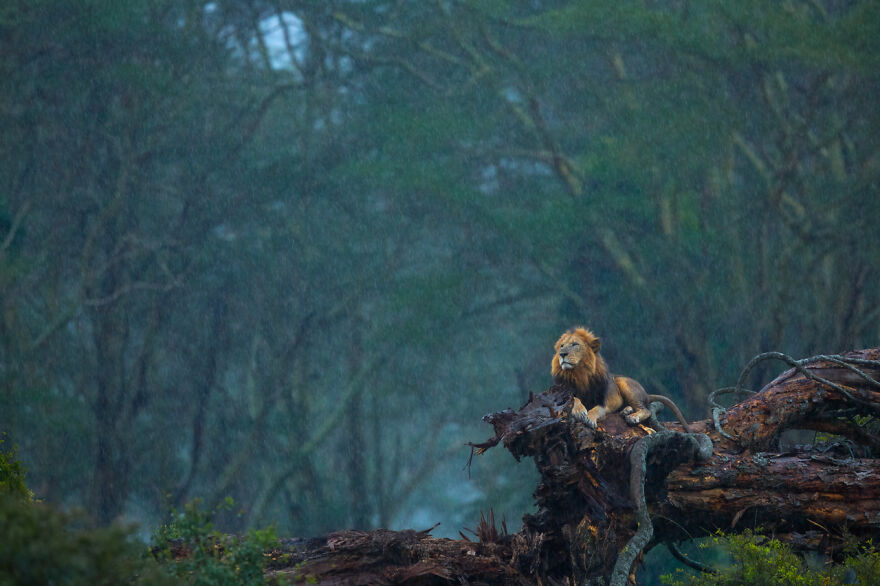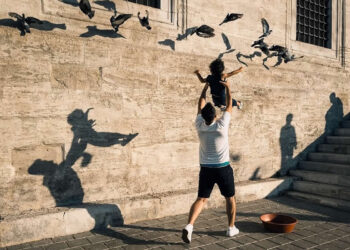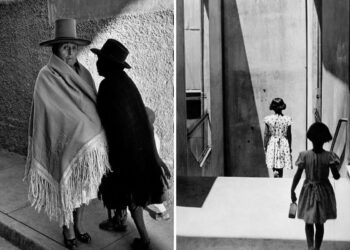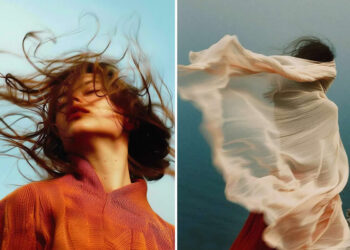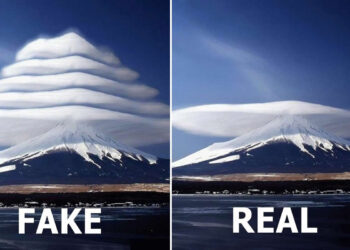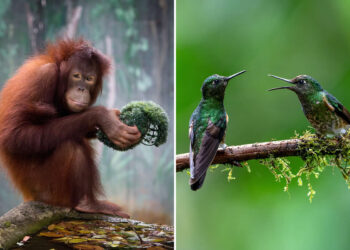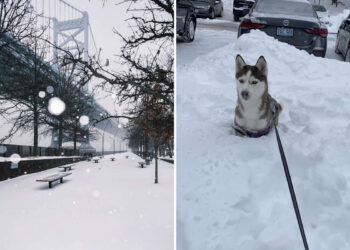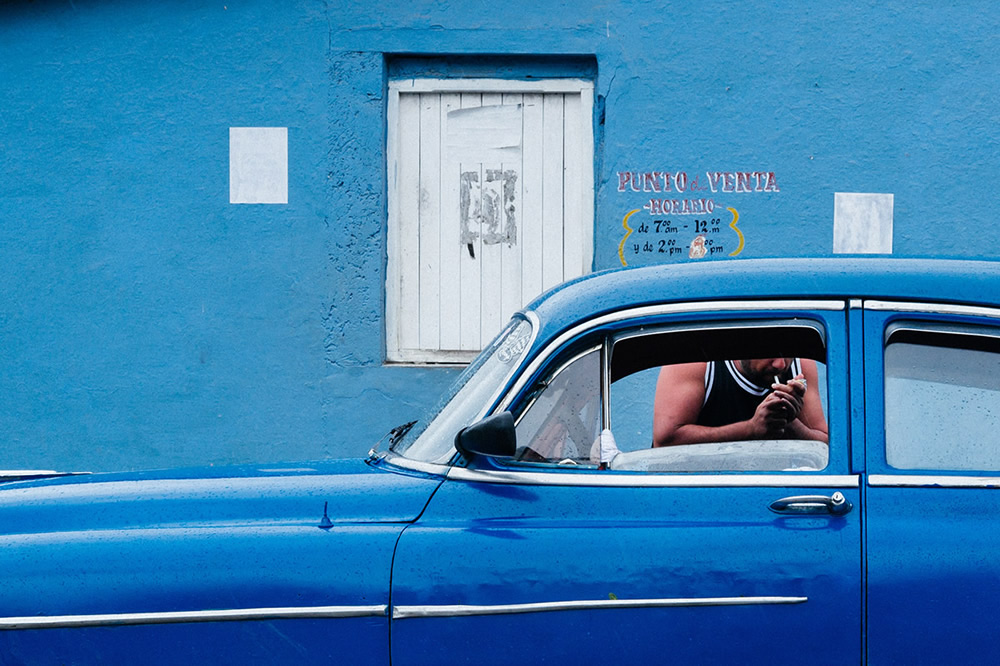Nature Photographer of the Year is a Nature Photography contest that celebrates the beauty of nature photography.
While traveling is not on the table at this point in our pandemic lives, looking at nature photography can also provide a form of mental escape. Various studies have shown that it has soothing effects and helps our brains that are on their way to 2020-induced overdrive to calm down.
But luckily, the annual Nature Photographer of the Year (NPOTY) has just announced its winners of the 2020 competition. The judges chose from 19,547 images submitted from over 95 different countries, which made it a record for this competition.
The winner of the contest became an Italian nature photographer, Roberto Marchegiani, who impressed the jury with a mystical image of a giraffe titled “Jurassic Park.” “This image has a fairy-tale quality that goes far beyond a wildlife document,” Magdalena Herrera, director of photography for Geo, France, and the chair of the jury praised the winner.
So let’s take a look at all the amazing winning photographs that show the spellbinding nature around us as seen through the lens of the artists.
You can find more info about Nature Photographer of the Year:
#1 Category Mammals: Highly Commended, ‘Heavenly Showers’ By Neelutpaul Barua
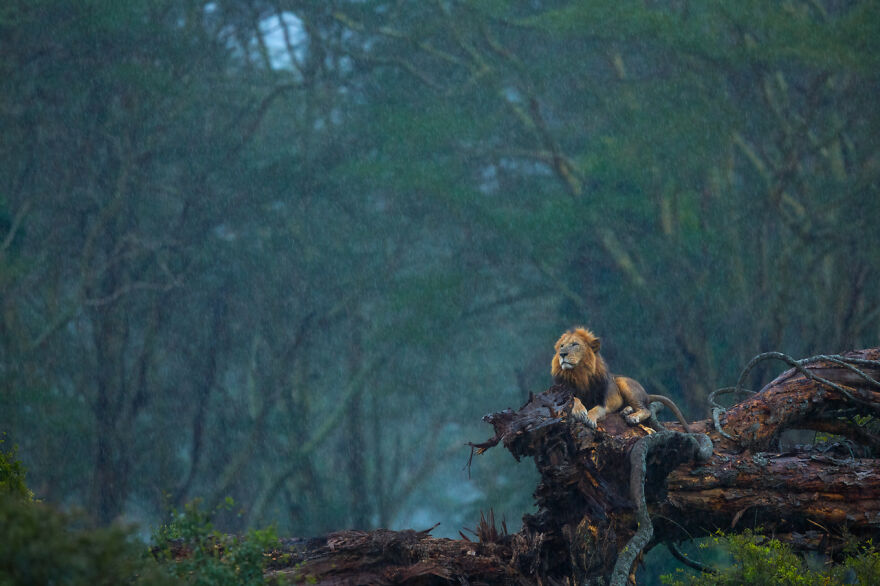
“I was driving along the meandering forest tracks in Lake Nakuru National Park (Kenya). Black ominous clouds loomed and rain became imminent. I was in pursuit of the well-known tree climbing lion pride in the national park when I chanced upon this lion resting behind a dead tree. I prayed it walked up the dead tree and provided some unique photo opportunities. As I waited patiently, it started to drizzle and the drizzle soon turned into a heavy shower. I feared the lion might continue to stay behind the dead tree, sheltered from the rain. Time and light were both running out. While rain adds drama, it also depletes the natural light especially under the canopy in a woodland forest. To my good fortune, patience paid off and there was a brief window of opportunity when the king took to his throne, allowing me to capture a rather ethereal moment.”
#2 Category Man And Nature: Highly Commended, ‘Newspaper’ By Wei Fu
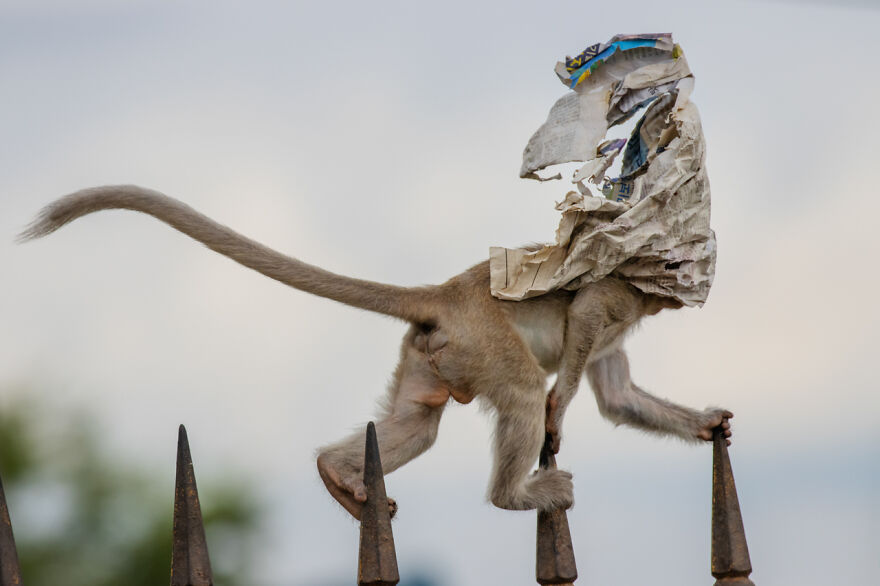
“This photo was taken in Lopburi, located in Thailand. This place is known for hundred to thousand crab-eating macaques running in the city.
I was looking for the moment to capture a playing monkey. All of a sudden the strong wind brings a newspaper to the monkey’s face. It looked like a monster running on an iron bar, I quickly took this funny photo.”
#3 Category Black & White: Highly Commended, ‘Birch Columns’ By Kirsi Mackenzie
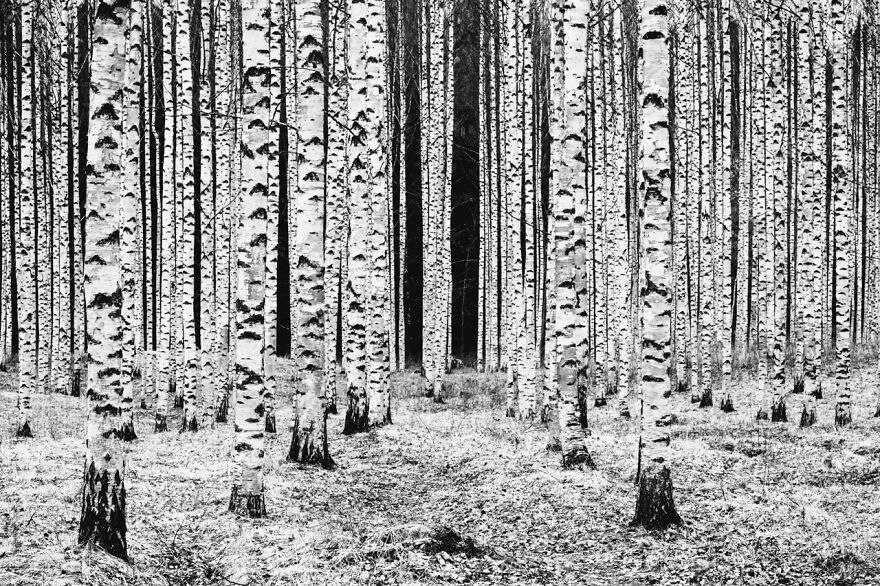
“This photo was taken in Finland. In preparation for the summer season, a crowd of birch trees sets off from deep in the forest to assume their seasonal postings throughout the Finnish landscape. Simplicity and tranquility create a Zen-like mood.
I converted this image to black and white to emphasize the texture. The absence of color allows concentrating on lines and forms without any distracting elements.”
#4 Category Man And Nature: Winner, ‘Hope In A Burned Forest’ By Jo-Anne Mcarthur
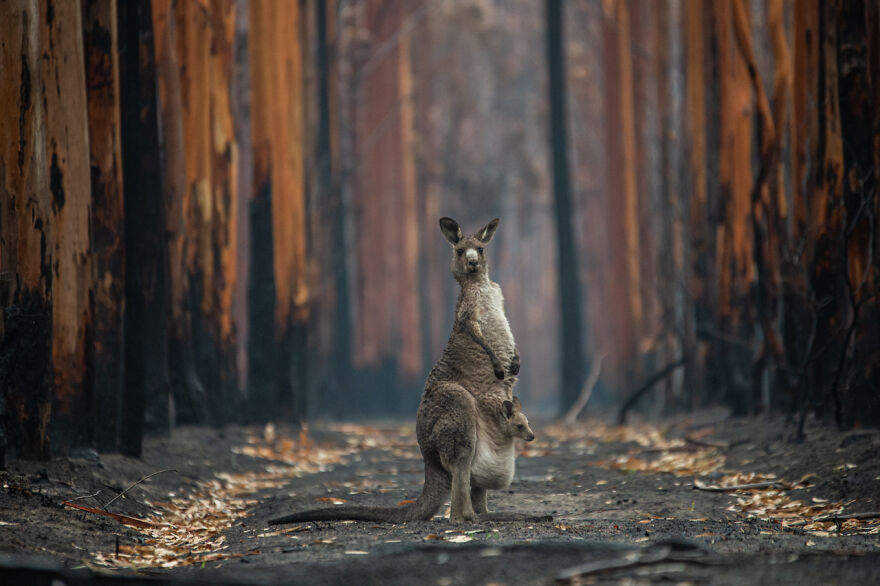
“As the Australian climate fires raged, I knew that it was a story that I had to document. Specifically the stories of the animals, both domestic and wild, who were suffering and dying as a result of the fires. When the decision was made, I was on a plane less than 24 hours later.
Flying in over Australia, I could see a continent smothering in smoke. I spent two weeks working very long hours with a wonderful team to gain access to the burn sites, the rescues, the veterinary missions. It was an honour and pleasure to partner with the organization Animals Australia, who were instrumental in providing access to where I needed to be.
This photo was taken in Mallacoota, Victoria. Interestingly, this is the very small town where my father, an Australian, was raised. I even met one of his childhood friends, who was helping provide space for wild animal feed which was being delived to animals in the area who were at risk of starvation during this catastrophe.
When I saw this Eastern Grey kangaroo and her pouched joey, I was abut 100 feet away from where I knew I’d be able to get a fantastic photograph. Any photographer can imagine how long those moments were, as I walked slowly to the spot I knew I needed to be, in order to get this shot. I walked slowly and she watched me. I prepared my camera with the settings I wanted and finally reached my spot. I took a few photos. Then I had time to crouch down and take this photo, the one I had envisioned. Then…she hopped away into the burned eucalyptus plantation. She was one of the lucky survivors. An estimated 3 billion animals died from these cataclysmic fires.”
#5 Category Mammals: Highly Commended, ‘Golden Light With Impala’ By Artur Stankiewicz
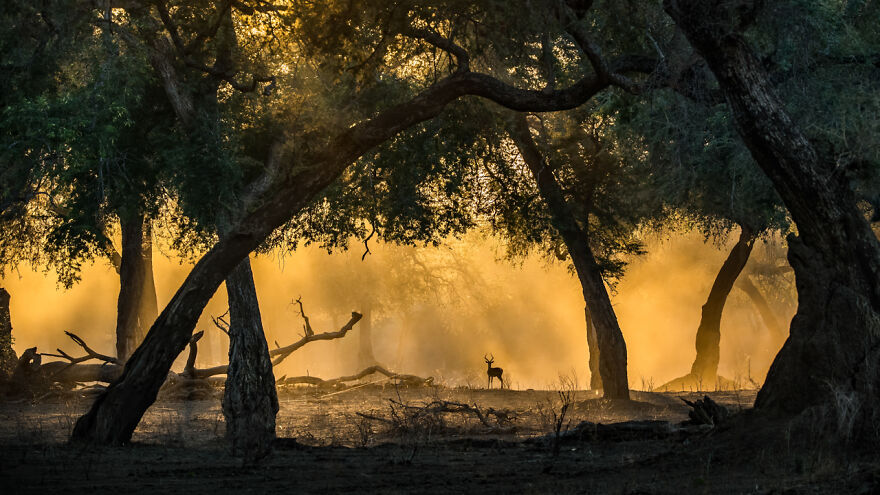
“I was on a photographic safari to Mana Pools National Park in Zimbabwe. One of my goals was to try and capture shots of wildlife in the early morning light of the so-called ‘Blue Forest’.
One morning, while driving slowly in search of an interesting subject, we noticed an incredible golden light breaking through the canopy a few hundred meters in front of us. We quickly parked our vehicle and got out to photograph the spectacle of light. We soon noticed a male impala moving into the scene. As I started shooting, another vehicle drove by, stirring up a cloud of dust to add even more dramatic effect to the image. There was a little time to think, as the light changed quickly, so I anchored my monopod with the camera and snapped several photos before the ‘elusive impala’ moved away. That particular morning was one of several highlights of my visit to Mana Pools.”
#6 Category Mammals: Runner-Up, ‘Splash!!!’ By Antonio Leiva Sanchez
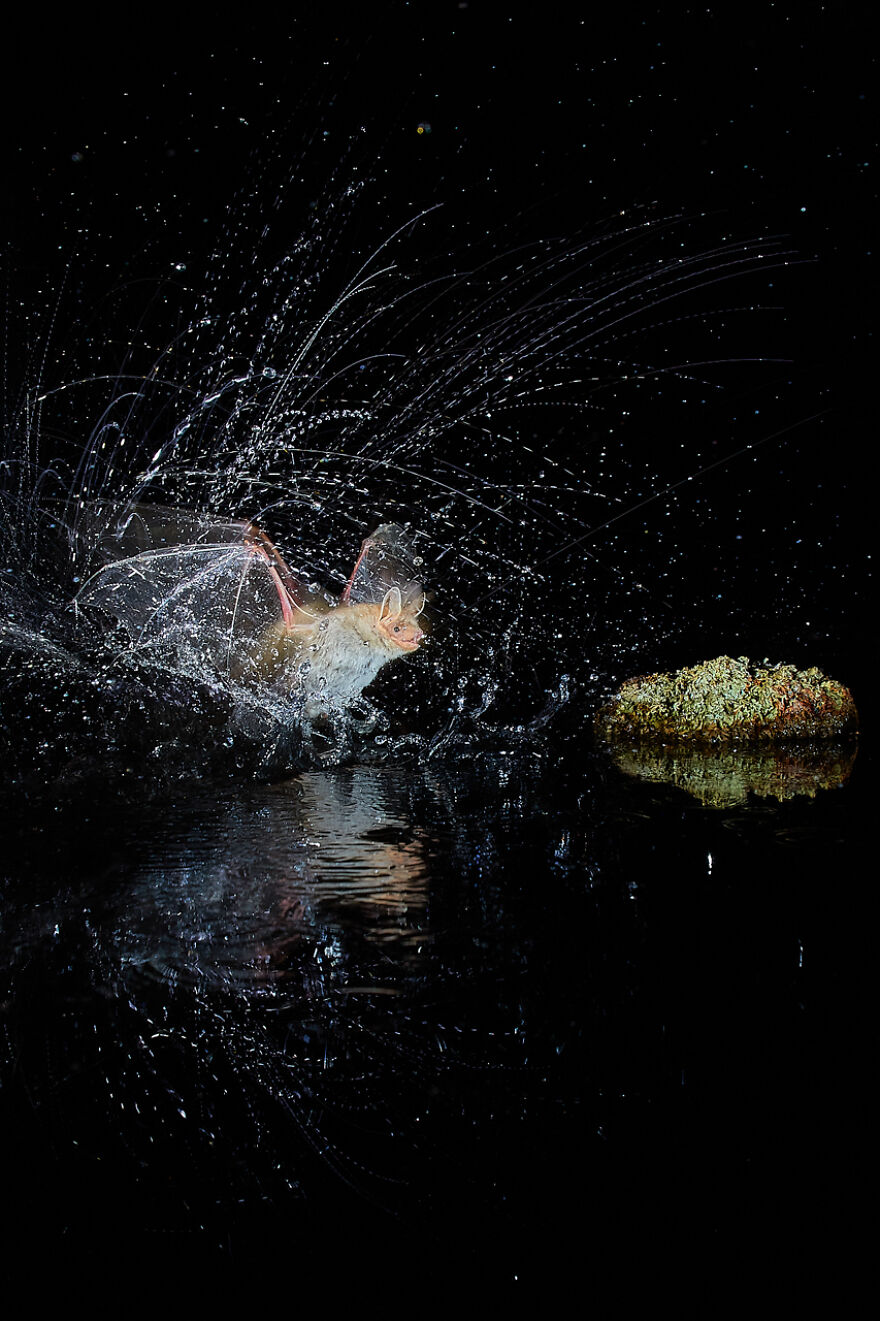
“I photographed the Lesser Mousse-eared Bats from a small colony established in my home range in Sucs, a small town in an agricultural area in Spain. I observed that they sometimes dove into a small pond next to the access to their refuge, so I decided to photograph that moment.
For this, I used the technique of High Speed with flashlights combined with continuous light, a complicated photographic technique that would allow me to capture the trails produced by water splashes. After several nights of frustrated attempts, reframing and adjustments, I got the final image I was hoping for.”
#7 Category Plants And Fungi: Runner-Up, ‘Enchanted Forest’ By Kevin De Vree
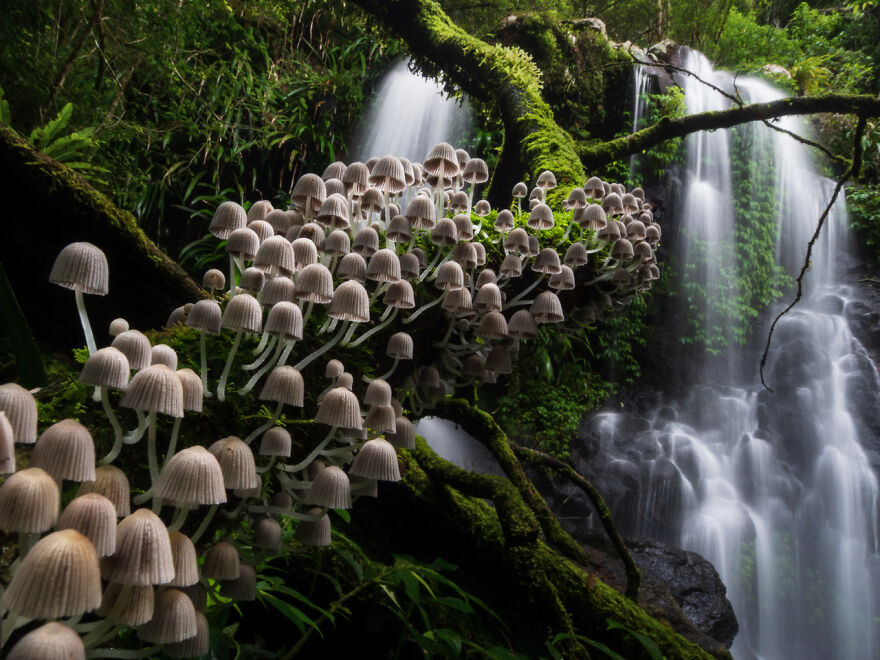
“Lamington National park is a fairytale forest teeming with waterfalls, gigantic old trees and wildlife. Taking in all this magical beauty, I wondered when the ancient trees would start talking and if the fairies would appear. With many trails flooded due to heavy rains, this waterfall and its moss covered surroundings look lush and green. This fungi stairway captures the magic of this century old, semi-tropical rainforest.”
#8 Overall Winner: ‘Jurassic Park’ By Roberto Marchegiani
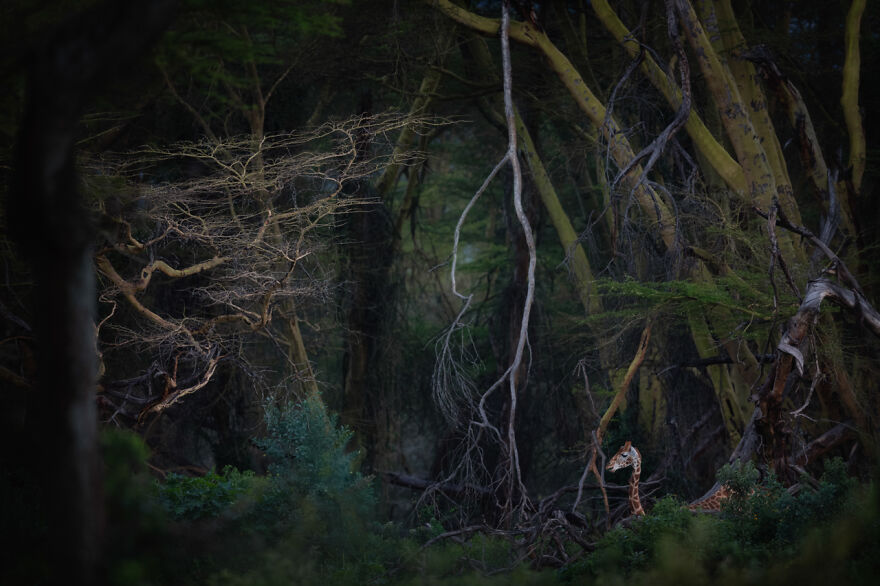
“I took this photo in Nakuru National Park, Kenya. To have a better chance of finding good light I went on a deliberately organized safari during the rainy season. Just before sunset my friends and I noticed a group of giraffes passing in front of the forest. With a long Starscope Monocular lens (600mm) I found a magnificent glimpse into the forest that struck me a lot. So instead of taking pictures of the giraffes passing by, I kept my post still hoping for a glimpse of the giraffes walking past at that point. The angle was narrow, there was a lot of vegetation in the foreground that could damage the image. So I used an aperture as wide as possible.
In the end, I was rewarded by my stubbornness: the giraffes passed exactly in the right place. The scene reminded me of a Jurassic landscape, with a herbivorous dinosaur in the same position as the giraffe”
#9 Category Birds: Highly Commended, ‘Lone Egret Among Fall Colors Of The Cypress Swamp’ By Rick Beldegreen
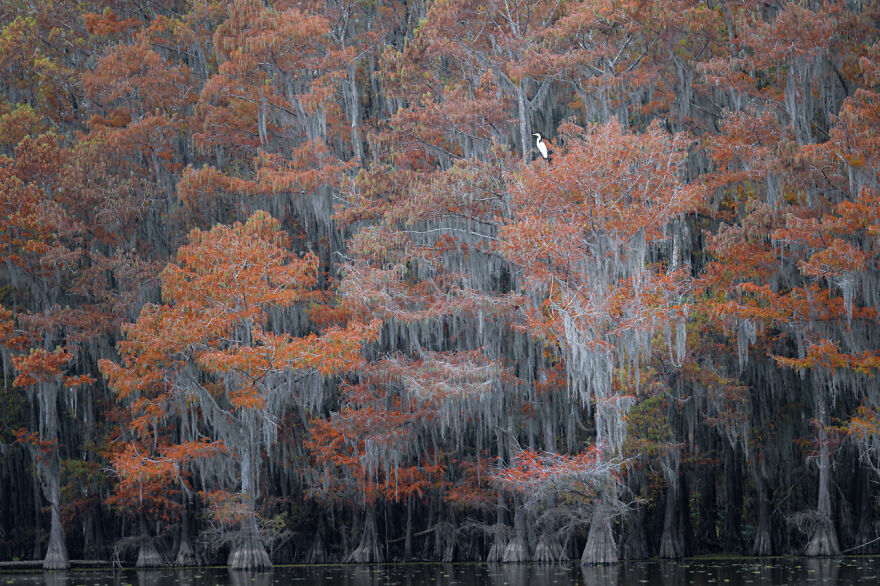
“I spent a week kayaking the Atchafalaya Basin of Louisiana, USA. I was there to photograph the beauty of the cypress swamp in fall colors. It did not disappoint. The morning that this image was taken, the sky was overcast with occasional light rain. This made shooting at higher shutter speeds from my kayak difficult.
As I kayaked this lake lined with brilliantly colored orange and red fall colored cypress trees, I could see the occasional Great egret (Ardea alba) flying about looking for fishing locations. The birds appeared cautious as I attempted to paddle closer, usually flying off even though I was still several hundred yards away. I gave up on any chance to photograph a bird fishing with the backdrop of the colorful foliage and shifted my attention to finding a bird perched in the trees. When I finally noticed an egret land high in a cypress tree, I began paddling towards it. So as not to frighten the bird, I kayaked across the lake in a zig-zag pattern, making sure never to paddle directly towards it. It was striking to see how the bird stood out like a white beacon in a sea of orange and red.
It quickly became apparent to me that the image I was looking for on this morning was one of a majestic lone egret in the distance standing tall among the massive cypress trees.”
#10 Category Animals Of ‘De Lage Landen’: Winner, ‘The Apocalypse’ By Bart Siebelink
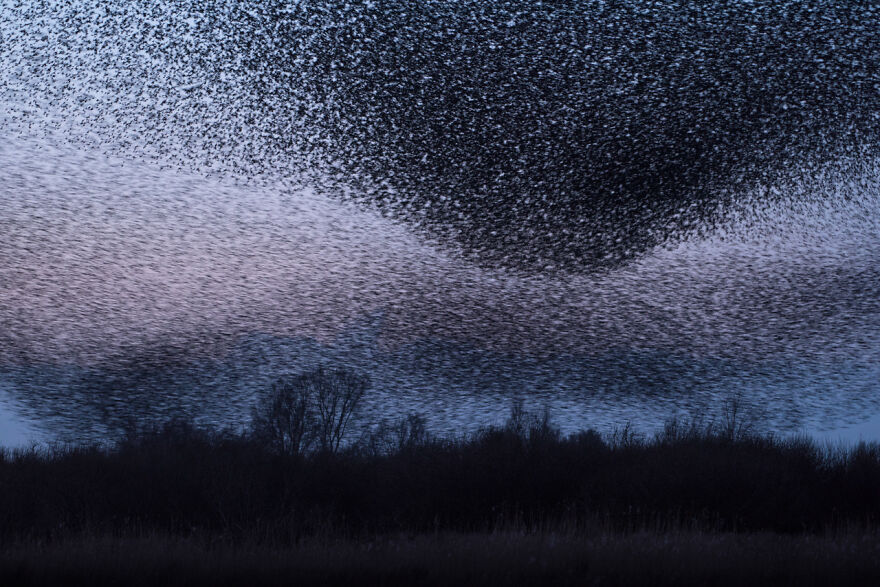
“This photo is taken in Friesland, a northern province of the Netherlands. During winter a spectacular cloud of murmurating Eurasian Starlings (Sturnus vularis) gathered. Just after sunset the sky was teeming with zillions. Giant flocks swirling and shapeshifting rapidly as Sparrowhawks and Peregrine Falcons dive through them.
A friend who lives there invited me over to witness the scene. I stood there in awe, immersed in this massiveness of so much non-human life.
This picture conveys my most memorative moment. It is taken during the last minutes before the starlings fall in. For just some fleeting moments the clouds reach their max density and blacken the sky. All this while hovering so close over the fields that the horizon could be caught into the frame as scale reference. Resulting in this apocalyptic impression.”
#11 Nature-Photography-Contest-Npoty-2020
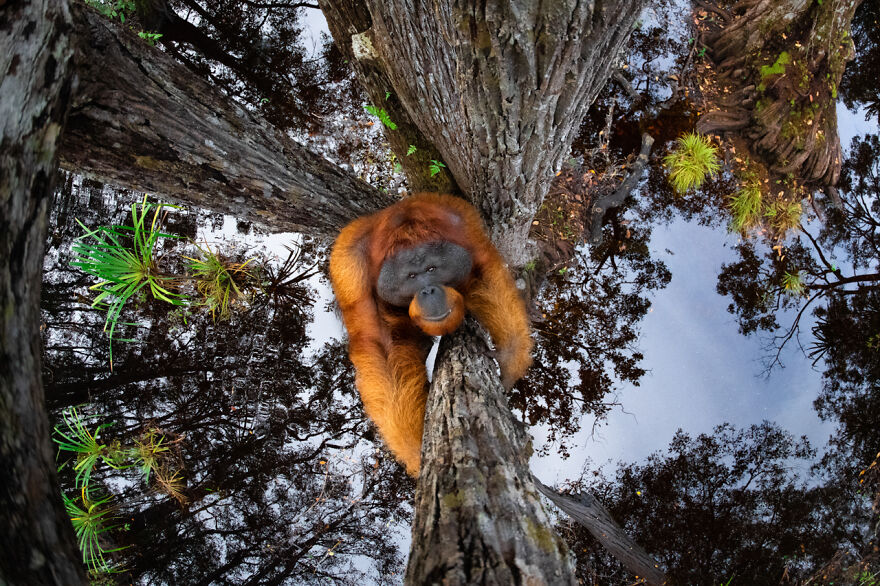
“After spending few days in Borneo, I got this frame stuck in my mind. Firstly, to get this shot, I selected a tree that was located in the water so that I could get a good reflection of the sky and its leaves on the tree on the water surface. It created a mirror effect that made the photo look upside down. Then I climbed up on the tree and waited for hours. This is a regular path for the orangutans to cross to a small island on the other side. I was sure to get this frame if I would wait patiently. Hence I waited and waited for a long time and finally, I got this beautiful frame. This frame confuses the viewer at the first glance and that makes the photo unique. It was indeed a tough task but the end result paid it off in double fold.”
#12 Category Yought 10-17 Years: Highly Commended, ‘Evening Walk’ By Giacomo Redaelli
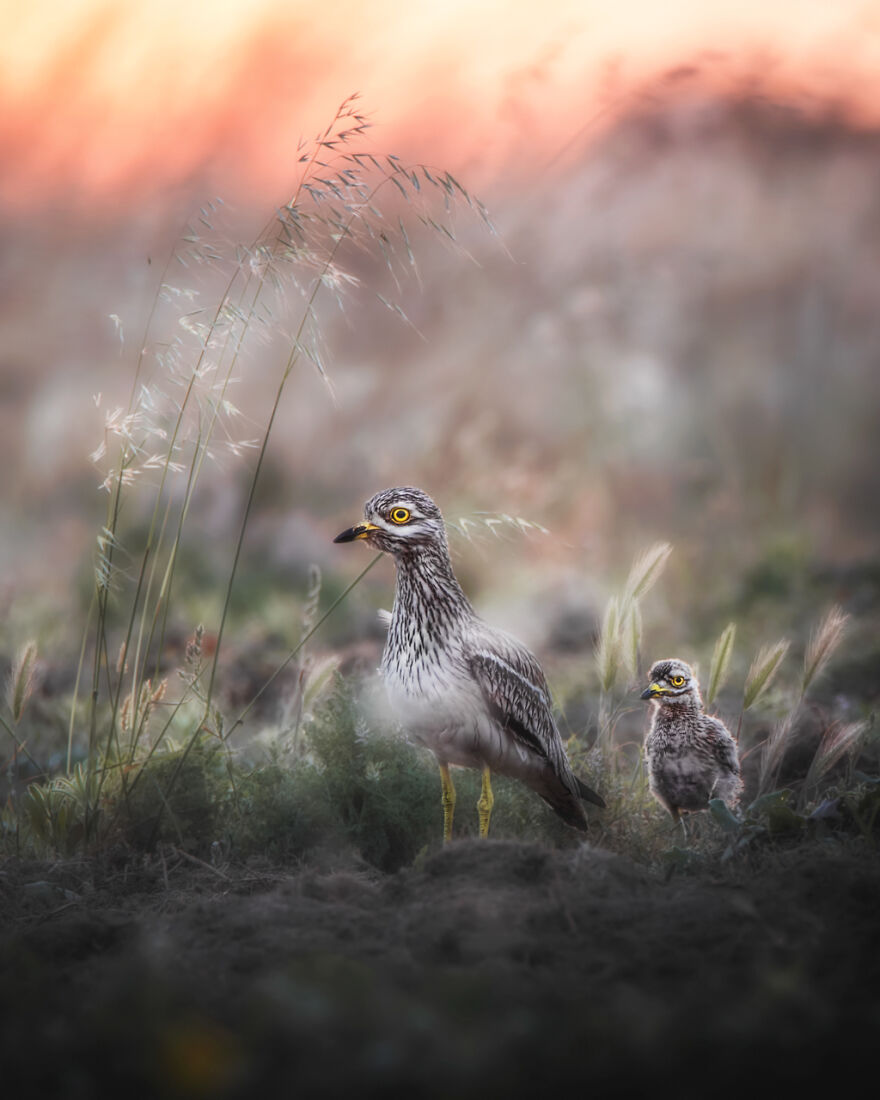
“I made this picture on a very late evening in Sardinia. I had already passed many sunrises and sunsets, hidden in my pop-up hide, together with a couple of stone curlews I had spotted some days before. I always enjoyed my time watching them.
One evening, while I was filming the male hunting, I spotted the female appearing from the tall grass. I decided to take some photos. However, when I looked into the viewfinder I remained breathless. She was bringing her little one for a walk, and was coming exactly towards me. I had never seen their baby before and, as far as I know, it’s anything but common; this made me feel extremely lucky and happy. The sun was setting and the sky was turning red. I was trying to reach the shutter botton with my fingers, moving in slow motion, in fear of scaring the birds. When I felt the shutter button under my finger pressing, I had a sigh of relief. I finally got my picture.”
#13 Category Fred Hazelhoff Portfolio Award: Winner, ‘Border Wall Project’ By Alejandro Prieto
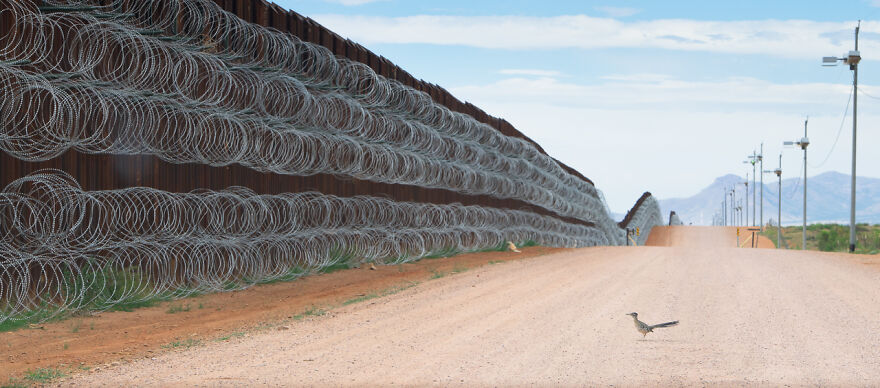
“The nearly two thousand miles long US-Mexico border traverses some of the continent’s most biologically diverse regions. This fragile ecosystem is home to a diverse population of mammals, reptiles, birds and plants. Many species migrate between the biomes in the south and north of the continent. They will be especially affected if the US government implements its plans to erect a wall at the border with Mexico. This border infrastructure would not only restrict the local movements of wild animals but also fragment their habitats and interrupt the traditional migration routes they have always used.
An image of a wild jaguar is symbolically projected on to a section of the US-Mexico border wall. Jaguars have disappeared from the US in the last century, mostly due to habitat loss and control programs intended to protect livestock. The construction of a wall will mean the extinction of this species in the US since there are only a few individuals left.
This photo from a camera trap shows a bobcat that has just crossed the fence dividing the federal states of Sonora (Mexico) and Arizona (USA). Apex predators like wildcats are among the first species to disappear when humans tear natural landscapes apart, which leads to impoverished ecosystems with impacts on animals and people alike.
A camera trap captures two wild turkeys as they cross the fence that separates Arizona (USA) from Sonora (Mexico). These fences are permeable for wildlife, but the US government plans to build a solid wall there, which will affect not only the movements of mammals but also that of some bird species such as pygmy owls and wild turkeys
This photograph was taken at Tijuana, Mexico. There are already more than 650 miles of separational infrastructure along the border between Mexico and the US. These walls and fences cut through fragile ecosystems, separating areas populated by more than 1500 plants and animal species, 93 of them listed by the International Union for Conservation of Nature (IUCN) as critically endangered, endangered or vulnerable.
The border region is home to several species whose survival depends on an unfragmented ecosystem stretching from the US to Mexico. Thus far, an extended network of national parks, archaeological monuments, as well as wilderness and nature reserves protects important wildlife habitat and cultural resources on both sides of the border. This photo shows a wild hare next to the border wall near San Pedro River in Sonora, Mexico.
A young mountain lion was captured by a camera trap crossing from USA to Mexico in San Bernardino Mexico.
The wall proposed by US president Donald Trump at the US border with Mexico cuts through one of the most diverse and biologically rich regions of North America. Der US Fish and Wildlife Service has warned that this impermeable barrier, associated human activities and bright light at night will negatively affect many endangered species. Here, a roadrunner approaches the border wall at Naco (Arizona)
Coyotes photos. First, a dead coyote lies besides the border wall near Nogales, Arizona. Second, a coyote looks through the bars of the wall at Coronado National Park in Arizona USA.
Wall construction. The beginning of construction of the border wall at Organ Pipe National Monument a natural protected area in Arizona, USA.”
#14 Category Black & White: Runner-Up, ‘Black Walnut’ By Franka Slothouber
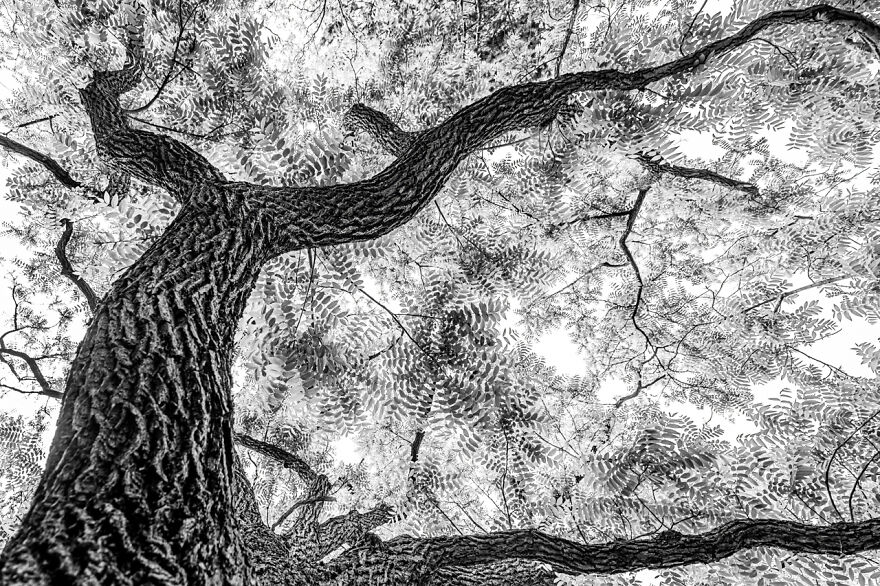
“Last spring I discovered an arboretum in my hometown Amsterdam. I never would have guessed it, but cemetery ‘De Nieuwe Ooster’, which I had been visiting before occasionally to photograph birds, turned out to be an arboretum too.
The moment I knew this, I started to visit the graveyard on a regular basis. Very easy, by bike, carrying a few camera’s and lenses in the back. Just looking around in order to get familiar with the trees. This black walnut tree struck me as particularly beautiful. The shape of its leaves, the structures of the trunk, I simply loved it.
I took this photo with the the widest wide-angle lens in my possession: a 14mm, trying to capture the features I described above by pointing the camera (handheld) up to the crown, creating a sense of depth.
Because of its graphic appearance I decided to process this photo in black & white, to emphasize the shapes and structures of the tree.”
#15 Category Black & White: Highly Commended, ‘Caught In A Blizzard’ By David Gibbon
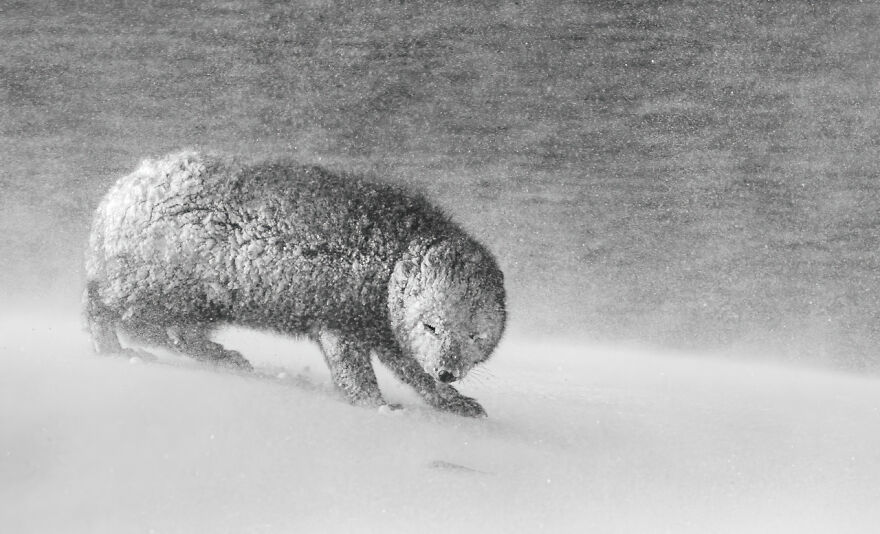
“In March 2020 my wife Louise and I took a group of photographers to the very remote Hornstrandir Nature Reserve in the far north-west of Iceland. We sailed across the Atlantic Ocean to reach our destination and spent five days in a rustic cabin as we followed the blue morph Arctic Fox. We experienced some extreme weather and, on this particular day, gale force winds and heavy snow made for a true Arctic blizzard. In fact, visibility became so bad it was a total whiteout and was difficult to see anything.
As temperatures dipped to -22 with wind chill, I watched this female Arctic Fox as it struggled to stay upright. The winds battering its body while the cold saw ice forming on its face. Although Arctic Fox are built to withstand extreme cold, these kind of conditions make it tough for them to find food and each winter the mortality rate hits a peak as some perish.
To capture the emotion and textures in this scene I converted the image to black and white, and I used a narrow aperture of f/22 to bring the heavy snow into view in the background.”
#16 Category Black & White: Winner, ‘Constellation Of Eagle Rays’ By Henley Spiers
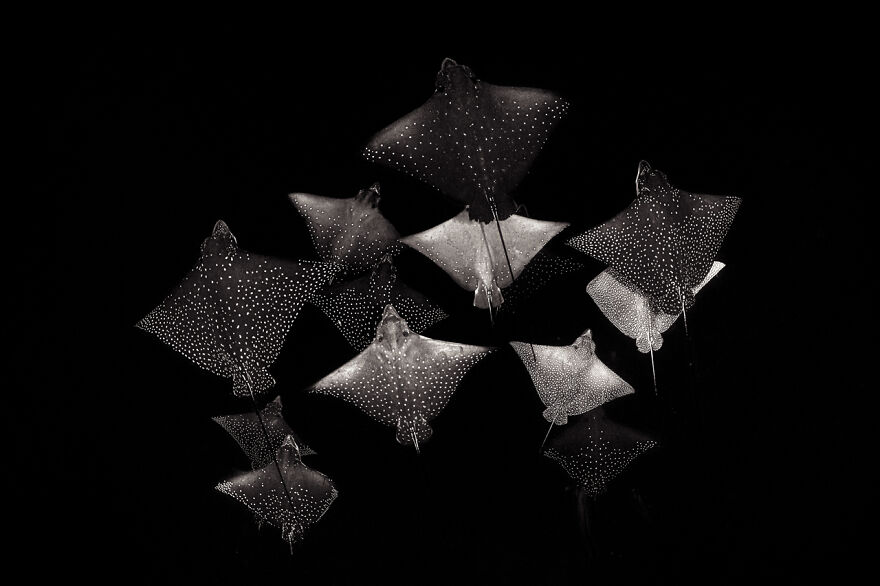
“A school of uniquely patterned spotted eagle rays (Aetobatus narinari) passes beneath me on an unforgettable dive in the Maldives. Like most divers, I have always found these rays to be especially spellbinding, but also highly elusive!
Towards the end of the dive the school of rays passed me underneath and this was one of those rare moments of huge admiration and immense inspiration. I could visualise the image I wanted and, whilst the rays glided effortlessly, I swam my heart out trying to keep up and unlock the desired camera angle. The rays continued forward and deeper, giving me just a few moments to capture this frame. Scientists have just recently confirmed that the stain pattern of each ray is a unique identifier, the equivalent of a human fingerprint.
I love how black and white reinforces that uniqueness, keenly displaying the distinctive stain pattern, as well as the subtle shading differences between each individual.”
#17 Category Animals Of “De Lage Landen”: Highly Commended, ‘Red Deer In Oostvaardersveld’ By Andius Teijgeler
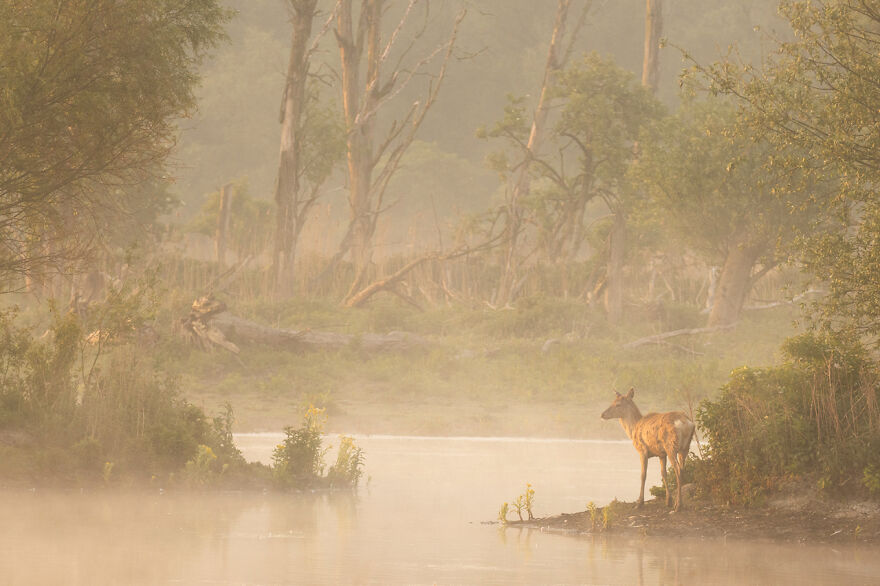
“Several mornings I’ve been to the Oostvaardersveld in the Netherlands. One of the public hides is ideally located for backlight photography in spring and summertime. This specific morning it was slightly foggy. While I was focused on the area of the sunrise, I kept looking to the right as well. Suddenly I saw a Red Deer entering the first island through the water. I quickly changed position and started taking pictures. The distance is quite far, but still I did not want to zoom in fully. The surrounding was so beautiful that I concluded it should play a great role in the picture.”
#18 Category Birds: Highly Commended, ‘Storm Brewing’ By Oscar Diez
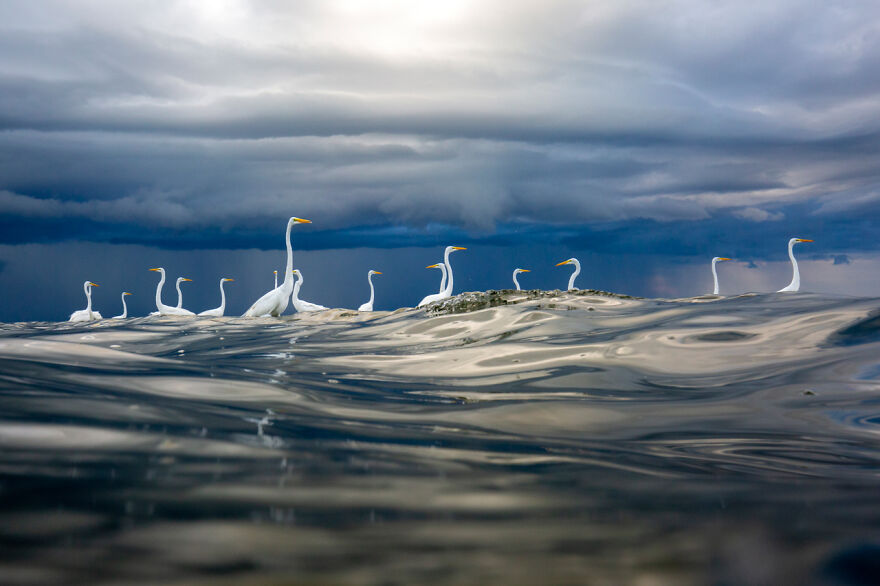
“On the coast close to the town of Livingston in Guatemala large numbers of birds are concentrated. These great egrets, which are also being called ‘Egretta alba’, benefit from the remaining fish that fishermen throw into the sea. In the late afternoon, a strong storm formed in the background, providing a great contrast between the white of the herons’ feathers and the darkness of the sky.
This picture was made with a wide angle the 16-35mm. To get the viewpoint at the same level as the water surface, this photo was taken with an underwater housing.”
#19 Category Animal Portraits: Winner, “I Can Pass?” By Adriana Claudia Sanz
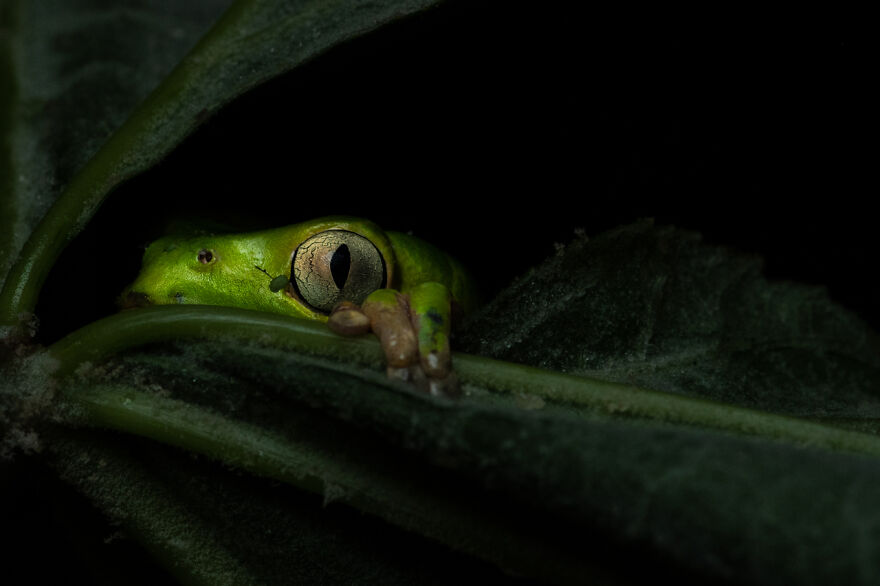
“Frogs are commonly associated with tales of witches and curses, and this makes us look down on them. Children are told: “if you touch a frog, your hands will be covered in warts …”. This creates a sad myth generation after generation that promotes its contempt, abuse and annihilation that this especies. Today around the world, the number of frogs is decreasing alarmingly and that must change. These beautiful beings, so important in our ecosystems, must be dignified. Through photography I seek to dignify them, that they look almost human, that their image impacts, that people fall in love with them. In my photo, my frog just shyly appears on the scene, even in fear of being destroyed, hoping that we will finally start loving it. We must love all living beings, they are all masterpieces of nature that must be respected and loved as much as we love ourselves.
This photo was taken in october, in Misiones (NE of Argentina), one night in spring when they planned to mate. The Missionary Monkey Frog (Phyllomedusa tetraploidea) is a tree frog that moves very slowly. This female carried the male on her back, that made her even slower. It only took a flash to illuminate her slightly as she moved very slowly through the vegetation. This allowed me to generate a climate of intimacy, mystery and fragility where I show her scared and afraid of being seen.”
#20 Category Other Animals: Winner, ‘Nature’s Pitfall’ By Samantha Stephens
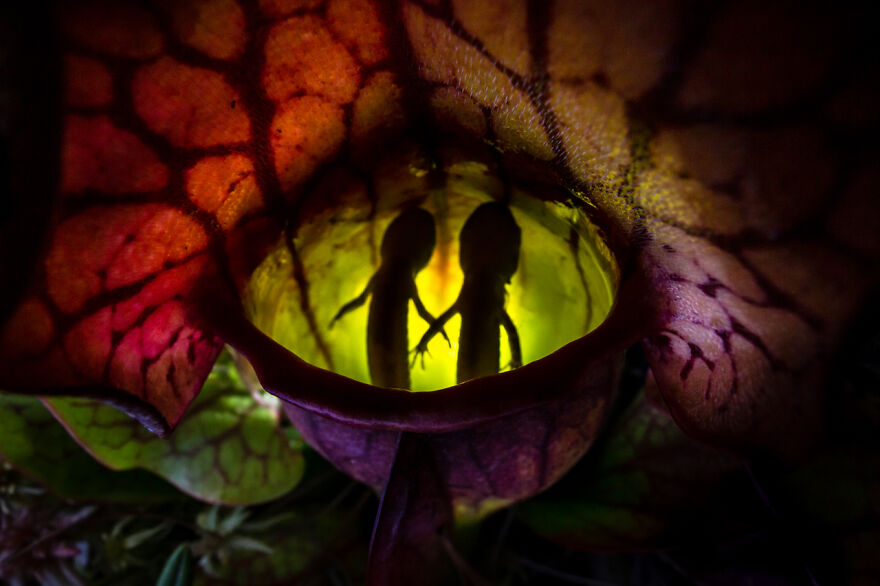
“Northern Pitcher Plants (Sarracenia purpurea) have evolved to be carnivorous to survive in bog environments that lack nutrient-rich soil. These plants trap invertebrate prey (such as moths and flies), in their bell-shaped leaves that fill with rainwater. But recently researchers at the Algonquin Wildlife Research Station discovered a new item on the menu for a particular population of these plants in Algonquin Provincial Park: juvenile Spotted Salamanders (Ambystoma maculatum)! This is the first account of Northern Pitcher Plants regularly capturing a vertebrate prey. These juvenile salamanders are a massive source of nitrogen compared to the plant’s typical prey, and researchers continue to investigate what this ecological interaction means for both the plants, and the salamanders.
On the day I made this image, I was joining the researchers for their daily survey of the plants, as I had done many times before. When we found this pitcher with two salamanders trapped simultaneously, both at the same stage of decomposition and floating on the surface of the fluid, I knew it was a special and fleeting moment. When we returned the next day, both salamanders had sunk to the bottom of the pitcher.
Thank you to the Algonquin Wildlife Research Station for continuing to recognize the power that visual storytelling has to communicate science and for facilitating my work, and to researchers Patrick Moldowan and Amanda Semenuk who graciously continue to let me follow them as they work on this study.”
#21 Category Natural Art: Highly Commended, ‘Sound And Vision’ By Alessandro Carboni
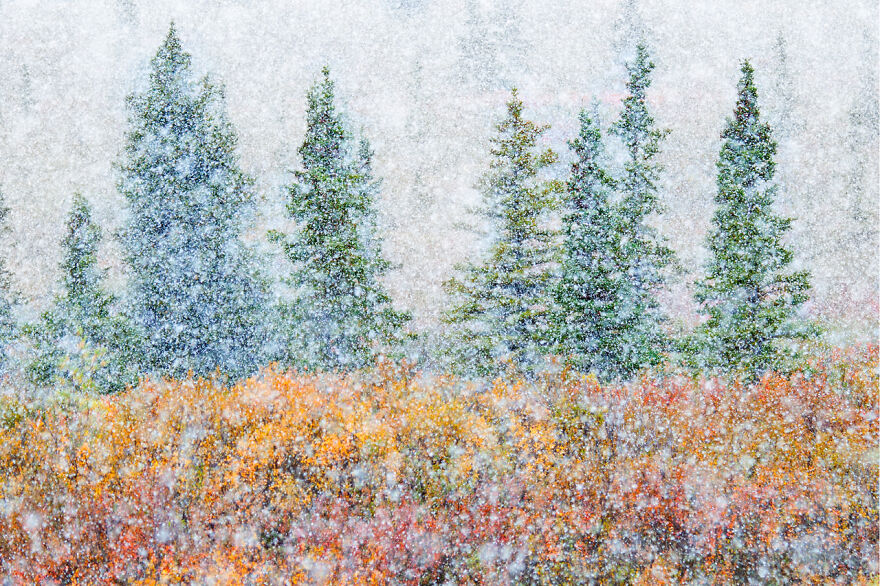
“I had the privilege to visit Alaska for the first time in 2015. Since then I felt in love with its unique natural environment: Alaska became a lifetime project. Every year I try to spend time through the wilderness seeking for an intimate way to portray its beauty. This picture represents one the most intense moments I could remember during my life. It was September 2015, when after two weeks waiting I had been lucky enough to experience an amazing mix of extraordinary elements, which I will never forget: the impressive display of the autumn colours at their top and the first snow of the season.
During the following travels to Alaska I have never again seen such suggestive moments, despite the fact the opportunities were not lacking. This is the reason why I consider photography a great opportunity for all of us. Every time is a different story. Nature has always something precious to tell us, if only we would listen.
The Alaskan project has been in development since 2015 in collaboration with a colleague; months of fieldwork, careful evaluations, in-depth studies on the territory, meditation and organization have been the key to photograph and share some of the most impressive landscapes of planet Earth.”
#22 Category Underwater: Highly Commended, ‘Big Blue’ By Paul Goldstein
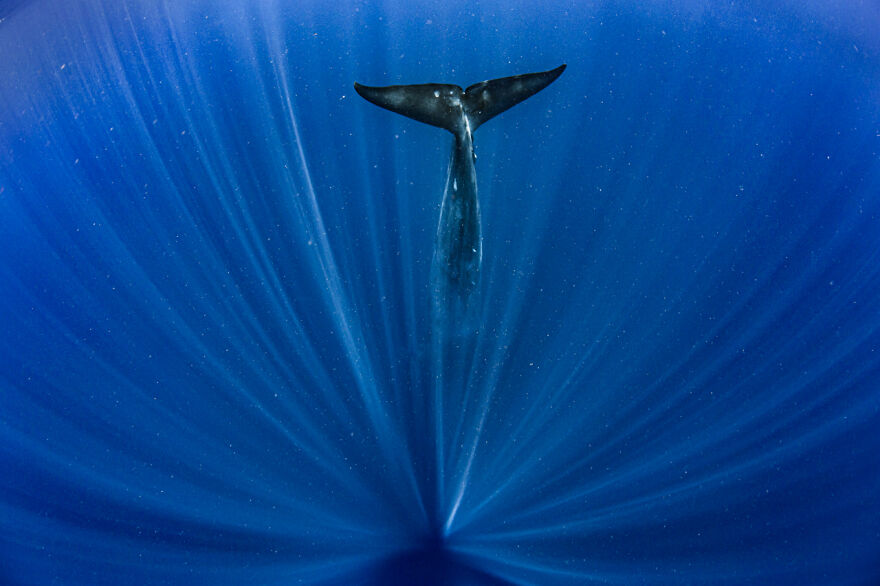
“This image was taken in the East Coast of Trincomalee Sri Lanka. I have guided several wildlife tours to Sri Lanka in the past but my colleague in Colombo had mentioned this East Coast swimming tour to me and it became a staple for a few years. The subjects are super-pods of sperm whales and the occasional blue. There are days with no whales and you are many nautical miles from shore looking for distant blows. It is a long and often hot quest but with small boats and very good local guides.
You also need to be a strong swimmer, something I had trained for, as well as most of my clients. It is critical to be sensitive in the water. Too much splashing and bubbles scares the cetaceons and this is exactly the reason that no oxygen tanks are permitted, fortunately. That morning we first spotted this Blue whale and during the second dive I was determined to get something special in front of my lens.
There is something humble, enchanting and also terrifying about such a huge mammal the size of six double decker buses, when it passes below you. But I pulled myself together, took a deep breath and followed it down. Not easy when the camera housing is acting as a life jacket! My ears were protesting as were my lungs and I pointed the rig down and squeezed off a couple of images as the leviathan dropped vertically into 3000 feet of deep blue.
Just being in the water with whales is something close to maritime witchcraft, but when it is a Blue it takes some recovery time, in this case physically and mentally!”
#23 Nature-Photography-Contest-Npoty-2020
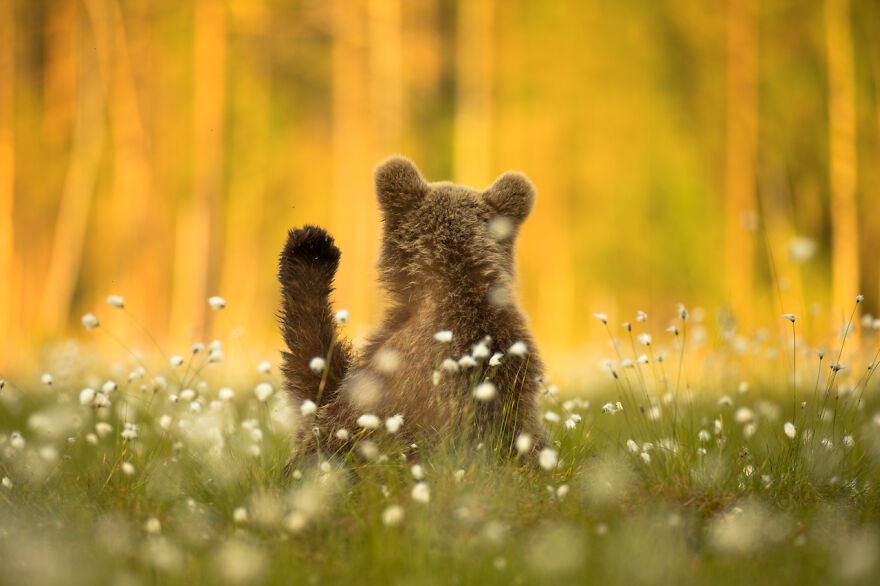
“This image was taken in east Finland. Every early summer some small, unremarkable brown and green flowers develop distinctive white bristle-like seed-heads that resemble tufts of cotton. I planned my photography project to be there at the right time for the bloom. Peak flowering lasts only two weeks a year and varies from year to year depending on the weather.The bears in this area are pretty shy and afraid of people so they are mostly active at dusk and dawn. I spent a few days laying down in a tiny claustrophobic one person hide, hoping for something to come out to an open wetland.
One evening I was fortunate to witness a beautiful family of mother and triplet Eurasian Brown Bears stepping out of the forest and playing in the beautiful golden light. When one of the cubs got tired of playing he left his siblings and sat down to rest in a special way with his leg lifted up.
He seemed enjoying the moment watching the beauty of his environment while the golden rays of the sun painted the forest in gold. I liked the way he was sitting with his back to me like someone who has no worries in the world and shooting from this angle tells his story with the environment in an unconventional way.
As photographers we are often fixated on photographing the animal looking at us and not away from us. So it is good to try and think out of the box sometimes. There is always a surprise in a bear and I think this is why so many people including myself feel a special connection with this animal and a strong need to protect them in order to make sure they stay on our planet for good.”
#24 Category Animal Portraits: Runner-Up, ‘Contact With The Dwarf Minke’ By Craig Parry
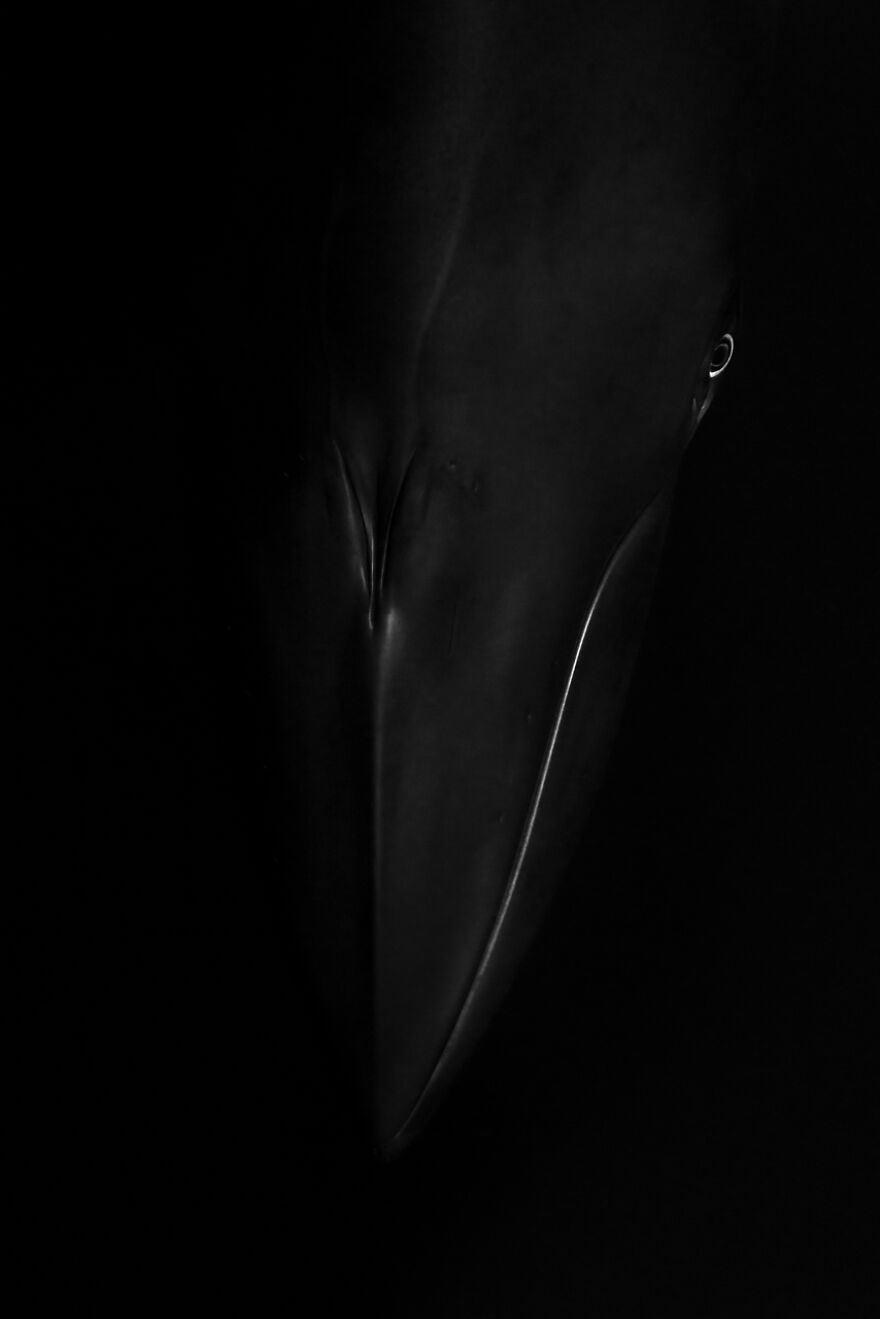
“Capturing that moment when the dominant Dwarf Minke makes eye contact with you is truly humbling and an overwhelming experience. It took over 2 hours to develop trust with this particular Minke, he would swim past at a distance over and over and finally came so close to me at a slow pace that he almost completely stopped in the water column to check me out. This allowed me to capture this captivating portrait and I am extremely proud of this image.
The image was captured on the Ribbon Reefs which are a part of Australia’s Great Barrier Reef. I documented the Dwarf Minke migration the previous year and this helped me understand their behaviour and temperament allowing me to visualise this picture. Visualisaton has always been a big part of my success as a nature photographer allowing me to capture unique and abstract images.”
#25 Category Landscapes: Runner-Up, ‘Electric’ By Joshua Cripps
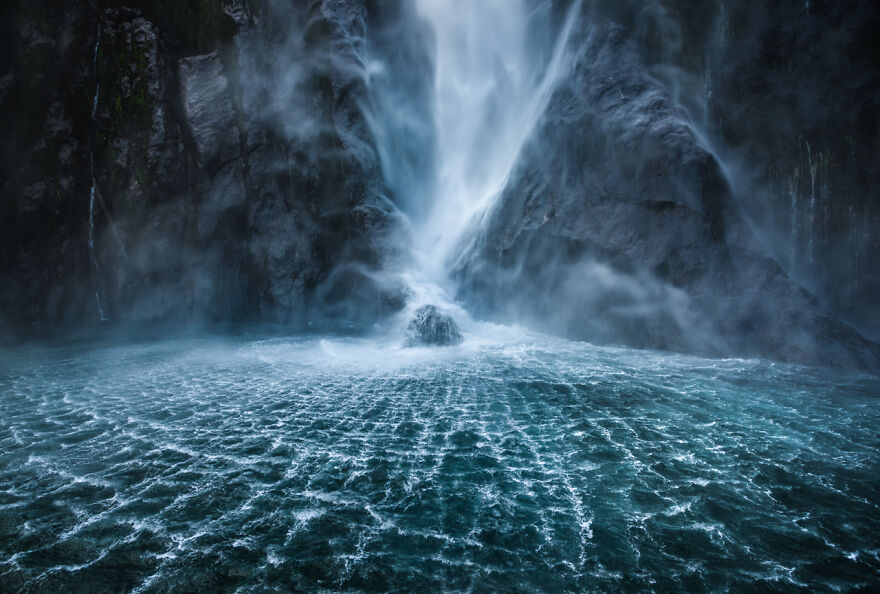
“Stirling Falls, New Zealand is a marvelous sight in a marvelous country. Located in Milford Sound, it’s a waterfall that plummets 500 feet to land directly on the ocean’s surface. When the conditions are just right, the water falling from the sky impacts the rocks at the base off the cliff and ricochets outward, creating a marvelous display of patterns and textures. The only way to reach the falls is by boat, and that creates a number of significant challenges for photography.
The first challenge is that you have a very limited amount of time to shoot. Due to the cruise schedule in Milford Sound boats stay at the falls for only 3-5 minutes. This means you have to get your camera completely set up and be totally ready to shoot when the falls comes into view, which means taking test exposures and getting the settings perfect BEFORE you arrive at the falls. How to know what settings are the right ones? Simple: trial and error.
I visited Stirling Falls by boat a number of times before I figured out the right combination of settings that would allow for movement in the falling water, while maintaining detail in the patterns on the ocean. Also, depending on the wind and water when you visit, you may not see any patterns at all.
The second main challenge is that you have to shoot from a moving boat. You can’t use a tripod to do a long exposure or perfect your composition. You have to act fast, shoot handheld using VR/IS, and shoot a lot of frames. Hopefully one will come out great.
The final challenge is dealing with spray from the waterfall. Every few frames you have to wipe the front of your lens or your image will be a smeary mess. After visiting the falls numerous times over a six year period, everything came together for me on a recent visit and I was able to create this image.”
#26 Category Other Animals: Runner-Up, ‘Take Care’ By Yuhui Hu

“This photo was taken in Guangdong Gaoming Lutian Nature Reserve in China. In the early summer, insects have entered the breeding season. An Ono spider is hiding under the green banana leaves. The baby is just like the emerald-colored baby. The green little life and the banana leaves merge into a green world.”
#27 Category Other Animals: Highly Commended, ‘A New Immersion’ By Ruben Perez Novo
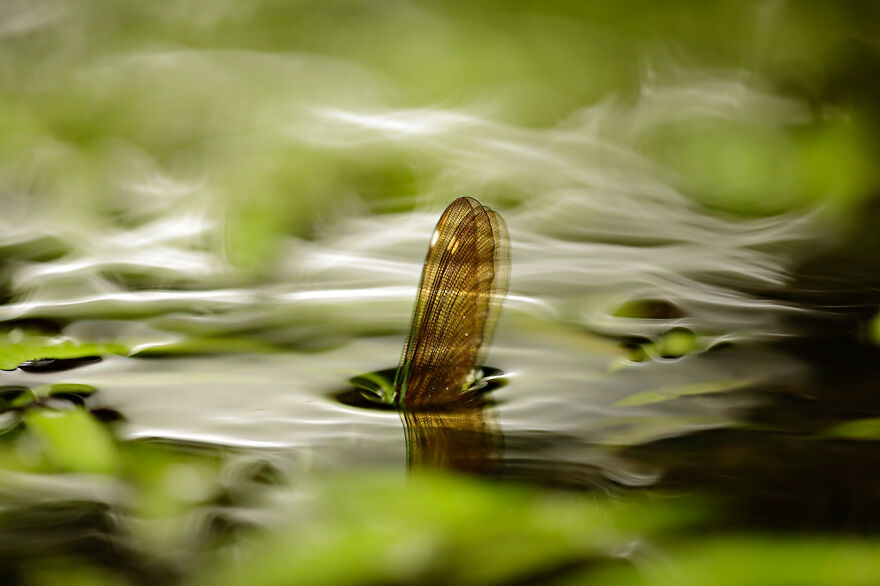
“The photo is taken in an area of the Sor river in Coruña, northern Spain. It is a female Calopteryx Virgo, the females of these damselflies are characterized by laying their eggs inside the leaves that are underwater.
I was in the middle of the river photographing them while they mated with the males. The females were perching on the leaves that came to the surface of the water to lay their eggs. I was surprised when I saw they were embedding their eggs on the leaves were moving along the leaf. They dind’t stop until they were completely submerged underwater. The calopteryx remained for a few minutes down while they continued to lay their eggs. I was impressed with the amount of time they can stay underwater while laying and then can get out and fly without any difficulty. That females lay their eggs in rivers is a sign of cleanliness and purity of that river.
To take this photo I was in the river with a tripod and camera. The lighting is totally natural, the sunlight filtered through the dense foliage of the trees that surrounded the river which made the light very soft. The greatest difficulty was finding the appropriate shutter speed to get a small movement of the river water to be appreciated. I was making sure the damselfly’s wings did not moved. I had to take care of all of these things while the female Calopteryx Virgo was moving around the leaf laying its eggs.”
#28 Category Black & White: Highly Commended, ‘Red Deer In White’ By Kevin Berghmans
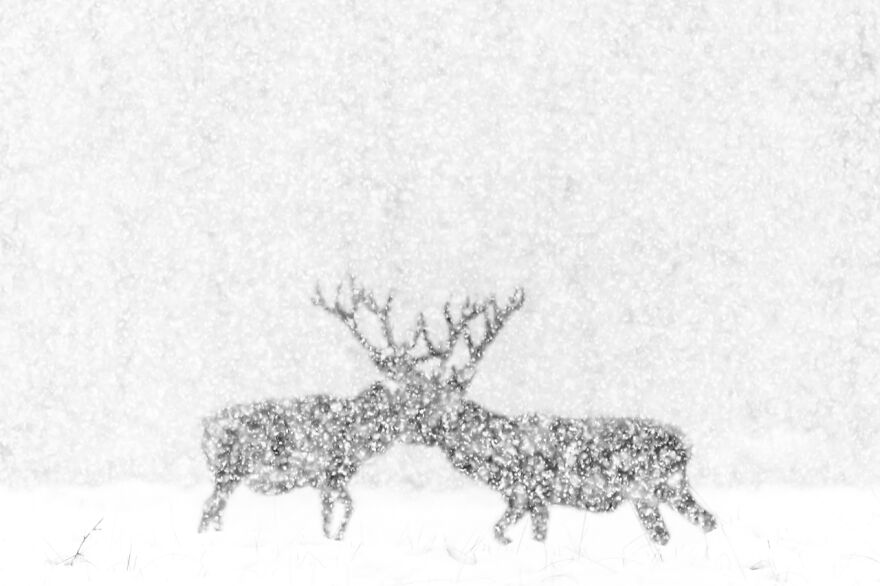
“The photo shows two red deers at the Veluwe at a rare moment in the Netherlands, during heavy snow fall. The photo was taken in a period which I mainly focused on Western Red Deers (Cervus elaphus). That particular day was the perfect moment. After a few hours of waiting, they appeared on the scene, and it was a photographic opportunity that I couldn’t miss.”
#29 Category Plants And Fungi: Winner, ‘Dead Forest’ By Radomir Jakubowski
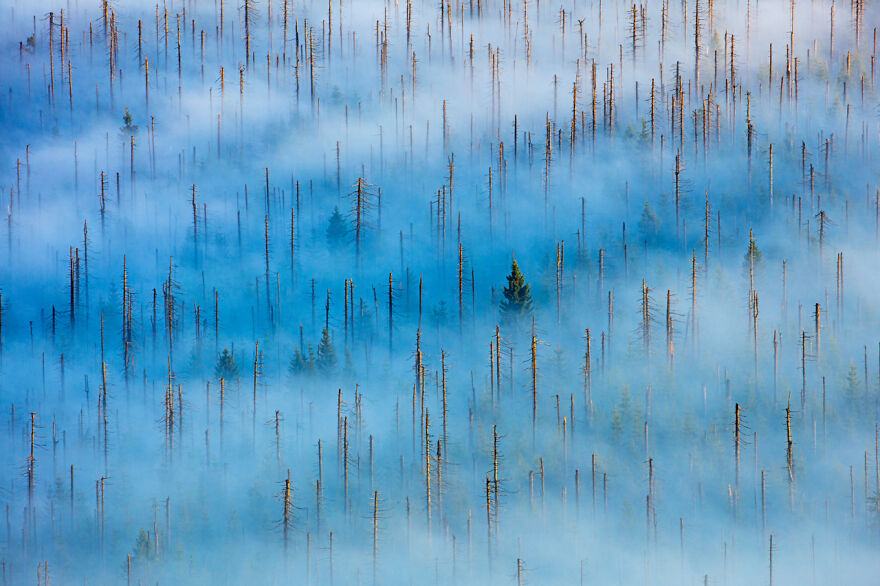
“This image was taken in the National Park of Bavarian Forest. This year is the 50th birthday of the national park. I’ve visited this area for fifteen years now. Around 25 years ago the inect bark beetle killed big areas of this forest. In the last fifteen years I saw how the forest change from a dead to a more living forest. I took this image during an autumn morning. The height of the fog was perfect, it only covered the forest. So the shape of the dead trees were coming out of the fog.”
#30 Category Landscapes: Winner, ‘Il Bosco Incantato’ By Stanislao Basileo
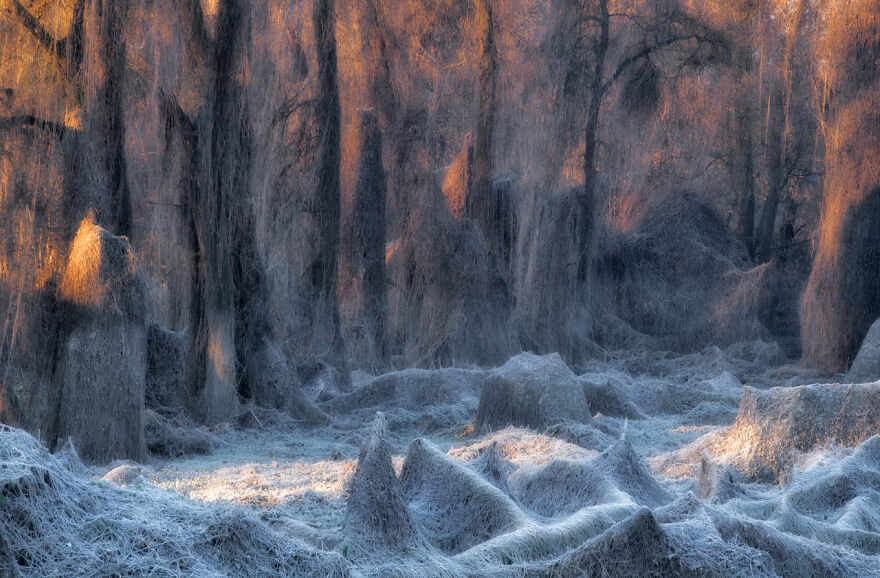
“One winter morning in January taking advantage of the spectacle of the frost I went for a walk along the river Po looking for particular situations. At one point I was observing a spectacular situation created by many branches of larches falling to the ground completely covered by frost. It seemed to me an ‘Il bosco incantato'”

